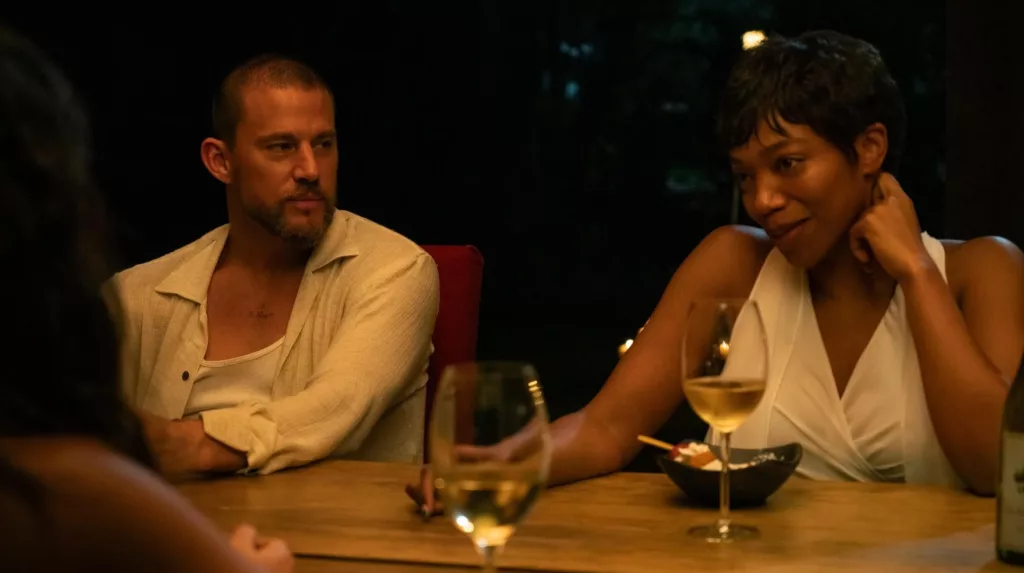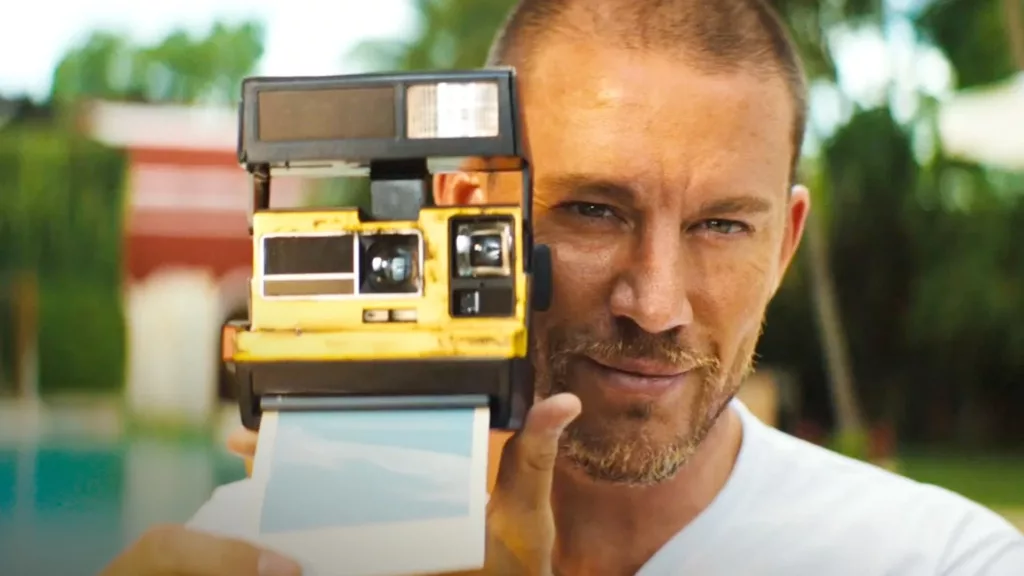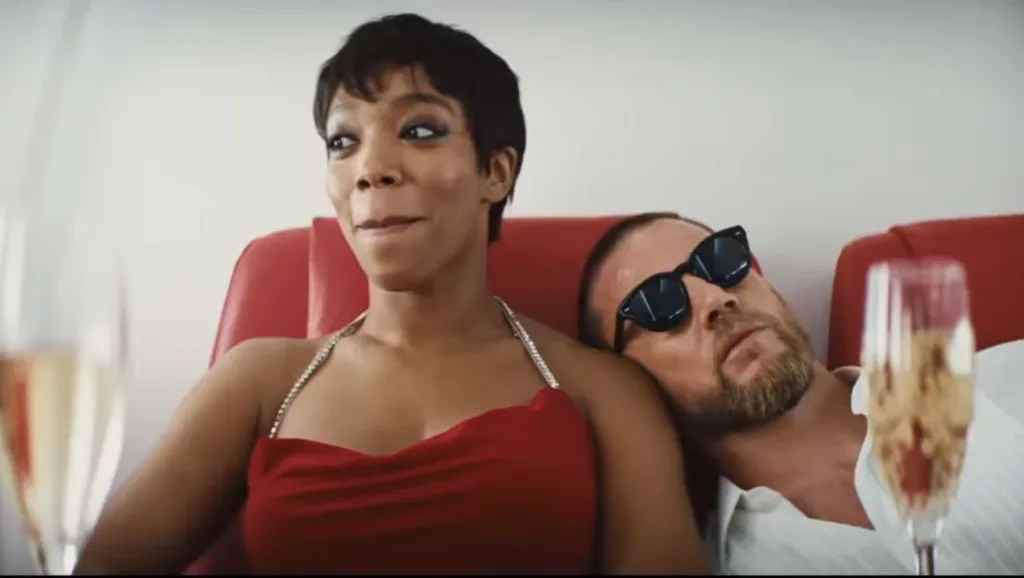Zoë Kravitz makes her directorial debut with Blink Twice, released in 2024. She also co-wrote the screenplay. The film follows Frida, a waitress struggling to get by, who receives an invitation that seems too good to be true.
One night, while working a catering gig, Frida catches the eye of Slater King, a tech billionaire. He’s trying to repair his image after some scandal, having made a public apology and buying a private island to retreat to. Slater finds Frida charming and invites her, along with her friend Jess, to join him and his entourage on the exotic property.
They arrive to find that the island truly is a lush paradise. Luxurious villas have been prepared for them, outfitted with designer clothes and perfume crafted from local flowers. Lavish meals are cooked, and endless drinks are poured. It all feels like a fairy tale escape from reality.
But little things start to seem off. Jess disappears without explanation. Frida finds strange bruises on her body with no memory of how they got there. Residents of the island seem to forget people they’ve just been talking to. As the days blend together in a haze, Frida begins to suspect something sinister is taking place beneath the surface of this island getaway.
Through its ensemble cast, including Naomi Ackie, Channing Tatum, and Adria Arjona, Blink Twice weaves an unnerving story laced with societal commentary. Kravitz shows promise in her directing debut, generating intrigue through mysterious occurrences. However, the narrative gets convoluted trying to juggle multiple plot threads. If the film tightens its focus, Kravitz’s vision could reach greater heights.
Twists and Turns on a Tropical Island
Zoë Kravitz’s directorial debut, Blink Twice, follows Frida, a waitress struggling to make ends meet in the city. One night, while working at a charity event, she catches the eye of Slater King, a wealthy tech billionaire. Slater extends a surprising invitation for Frida and her roommate Jess to join him and his friends on his private island for a luxurious getaway.
When they arrive on the exotic island, Frida and Jess are thrilled to find elegant villas prepared for them. Lavish meals are cooked daily by the staff, led by Slater’s friend Cody. Drinks flow freely as the group relaxes by the pool with no responsibilities. However, strange things start to happen that raise questions in Frida’s mind.
Jess suddenly disappeared without explanation one night. Bruises and dirt appear on Frida’s body, though she doesn’t remember how they got there. The island residents seem to forget things they just said or did. Frida tries to make sense of it with Sarah, another guest, but they find no answers.
Frida’s memories also become fuzzy and confused. She uncovers disturbing clues, like photos hidden in Slater’s quarters, that reveal a horrific truth about the island. In a frightening climax, the reality of their situation is exposed. Frida and Sarah must work together to escape the danger and uncover the full extent of Slater’s sinister scheme.
Twists keep the story thrilling as Frida pieces together what’s really happening on the idyllic island. Kravitz generates intrigue through mysterious details and jolting reveals. The film questions how well we really know people, even those who seem friendly, and highlights real-world issues of women’s safety. Blink Twice proves a tense, wild ride with surprises around every corner.
The Haunting Visuals of Blink Twice
Zoë Kravitz takes full command of the screen with her directorial debut. While navigating complex themes and twists, she maintains an unnerving atmosphere through spellbinding visual choices. The cinematography, production design, and editing immerse viewers in the film’s unsettling reality.
Kravitz partners with cinematographer Adam Newport-Berra to craft gorgeous yet subtly disturbing imagery. Scenes of the island’s natural beauty are shot with lush, vibrant colors. As darkness falls, shadows deepen, and the camera lingers on unexplained details. Closeups on the women’s faces accentuate emotional beats, while sweeping shots emphasize their isolation. Together, they breathe life into the lush yet ominous setting.
Production design by Roberto Bonelli is key to setting the scene. From the pristine white villas to flawlessly arranged breakfasts, every frame drips with luxury—yet perfectly manicured environments often hide the creepiest secrets. Vibrant flowers and fresh meals become unsettling when viewed through the film’s new lens. Subtle touches, like the looming red architecture and confused onlookers just out of focus, stir unease.
Kravitz’s editing elevates the film’s unsettling qualities with stylistic flair. Kathryn Schubert’s cuts jump between time periods to distort perceptions of events. Disorienting string scratches punctuate moments of realization. Montages and dreamlike sequences hurtle the viewer headfirst into Frida’s psychological unraveling. Cliffhanger endings keep the mystery propelling towards its chilling reveals.
Together, these elements wrap the audience in an intoxicating yet ominous spell. Even scenes of carefree excess carry an eerie undercurrent. The visual storytelling enhances thriller aspects while cultivating an immersive dreamscape rooted in darker realities. Kravitz’s assured control of the cinematic language draws out hidden horrors and keeps viewers constantly off-balance. Blink Twice truly comes alive through its masterful imagery, drawing you deeper into a nightmare you can’t look away from.
Powerhouse Performances Drive the Horror
Blink Twice stands as a testament to the impact of truly captivating acting. Led by a few powerhouse performances, the layered characters are what keep viewers enthralled until the frightening finish.
Naomi Ackie is a powerhouse as Frida, the audience’s lens into the unfolding nightmare. Ackie brings grit and gravitas, ensuring we relate to Frida’s fear while unraveling her secrets. Through subtle changes, we ride the waves of her trauma and resilience. Her raw emotion grips you with every shriek.
Adria Arjona elevates every scene as Sarah. Where some roles risk redundancy, Arjona imbues Sarah with fierceness and depth. Her bond with Frida, though tested, is the heartbeat of realism in this surreal story. These women feel gloriously real, thanks to Arjona.
Channing Tatum is perfectly cast against type as the calmly unsettling Slater. He oozes charm, yet his polite smiles carry an edge of unseen menace. Tatum burrows under your skin, so a violation of his trustfulness shakes you to the core. His psychology keeps you guessing.
Supporting actors like Alia Shawkat and Simon Rex bring humor and dimension, ensuring varied dynamics. Kyle MacLachlan is subtly unnerving as the unflappable therapist, his aura of unease lingering in memories.
While most deliver nuance, some roles could have benefited from further exploration. Frida and Sarah’s relationships with other women feel underexplored. Developing those threads may have intensified certain revelations.
Overall, compelling lead performances anchored in reality elevate Blink Twice’s twisting dreamscape. Kravitz draws out her actors’ greatest strengths to ensure viewers remain gripped throughout the ever-mounting terror.
Distressing Truths Emerging from the Darkness
Blink Twice grapples with weighty subject matter through its surreal psychological thriller framing. At its core, Kravitz focuses on the trauma of sexual violence against women and the insidious ways it can be perpetuated or hidden from view.
Frida’s story is one of piecing together disturbing truths about her experiences and unseen threats on the island. Through her emerging memories, the film exposes the facade of luxury, disguising darker realities. Kravitz presents an unflinching look at the psychological impacts of abuse and the systemic forces that can enable harm.
These disturbing revelations are all the more affecting thanks to nuanced performances like Ackie’s. Yet Kravitz balances such heavy themes within an unsettlingly dreamlike milieu. The lush surroundings contrast starkly with what lies beneath, amplifying viewers’ unease.
Blink Twice also comments on women’s experiences. The predatory island environment underscores how visibility does not always equate to safety or empowerment. Frida and Sarah’s bond offers a glimmer of solidarity, even in their dire circumstances.
While not without flaws, the film sparks meaningful dialogue around its subject matter. Through an artful fusion of genres, Kravitz crafts an unsettling allegory that lingers in viewers’ minds. Ultimately, Blink Twice shines a light on survivors’ courage in speaking out against injustice and demanding accountability, even from systems intent on forgetting.
twisting Thrills and Room for Growth
Blink Twice takes viewers on a deliciously sinister ride, with Kravitz expertly cranking up the tension through twists and unnerving imagery. She is unafraid to confront hard themes and brings a sly grin to moments that could have felt heavy-handed in lesser hands.
Where the film works best is the unsettling atmosphere and suspense. Sparse phone use isolates characters, and production design taps into deep-seated unease around coercive luxury. Constant misdirection keeps audiences guessing in the best way. The direction holds back just enough information to let imaginations run wild.
However, some critics note that the story feels overstuffed in places. Narrative missteps like underdeveloped characters and loose plot points dilute the profound messages at their core. While each actor delivers compelling moments, not all are fully realized.
Additionally, early social commentary around power dynamics becomes subordinate to the gnarly conclusion. More focus could have strengthened these currents and left a deeper sting.
Ultimately, Blink Twice demonstrates Kravitz’s command of cinematic language and fearless willingness to challenge norms. With refinement of story architecture and character depth, her prowess could reach even greater heights. Minor flaws aside, its unsettling resonance will linger long after any credits roll. With nuance and experience, Kravitz’s future in the director’s chair looks extraordinarily bright.
A Divisive but Promising Start
Zoë Kravitz’s directorial debut, Blink Twice, was bound to polarize audiences with its unsettling subject matter and twist-filled narrative. Reactions to the film show it succeeded in sparking discussion, for better or worse.
At its best, Blink Twice proves Kravitz has a talent to watch behind the camera. She crafts an eerie atmosphere and ratchets up tension through disorienting editing. Expect the unexpected in her storytelling. A strong ensemble elevates the drama, especially standouts Naomi Ackie and Adria Arjona.
Yet imperfections in Blink Twice’s script and character development undermine its impact. Not all symbols click into place, and tonal shifts feel abrupt. The commentary around women’s issues also gets lost in the climax chaos.
Ultimately, Kravitz takes bold swings but doesn’t always land them. Her vision shines through nonetheless. With experience, her technical skills and thought-provoking voice will likely strengthen.
For adventurous moviegoers, Blink Twice delivers an unsettling ride worth braving. Others may find its nastier themes too much. As a debut effort, it confirms Kravitz’s promise behind the lens and passion for provoking change. Her future films should spark renewed anticipation.
The Review
Blink Twice
Blink Twice is an ambitious, if flawed, film from a talented new director. Zoe Kravitz takes bold stabs at addressing complex social issues but bites off more than her narrative can chew. While the atmospheric chills and strong performances keep viewers engaged, some may find the experience dissatisfying or disjointed. Ultimately, Blink Twice shows that Kravitz possesses a keen eye behind the camera and isn't afraid to stir controversy. With experience, her vision could shine even brighter. For those willing to brave its darker themes, there are unsettling thrills to be found.
PROS
- Atmospheric and unsettling tension
- Strong performances, particularly from leads Naomi Ackie and Adria Arjona
- Director Zoe Kravitz takes bold creative risks with ambitious themes
CONS
- The narrative is disjointed, and characters lack development at times
- Social commentary gets lost amid the density of plot twists
- Tonally shifting and uneven






















































Discussion about this post